Unit 6 I have to go back to Canada 课件
文档属性
| 名称 | Unit 6 I have to go back to Canada 课件 |
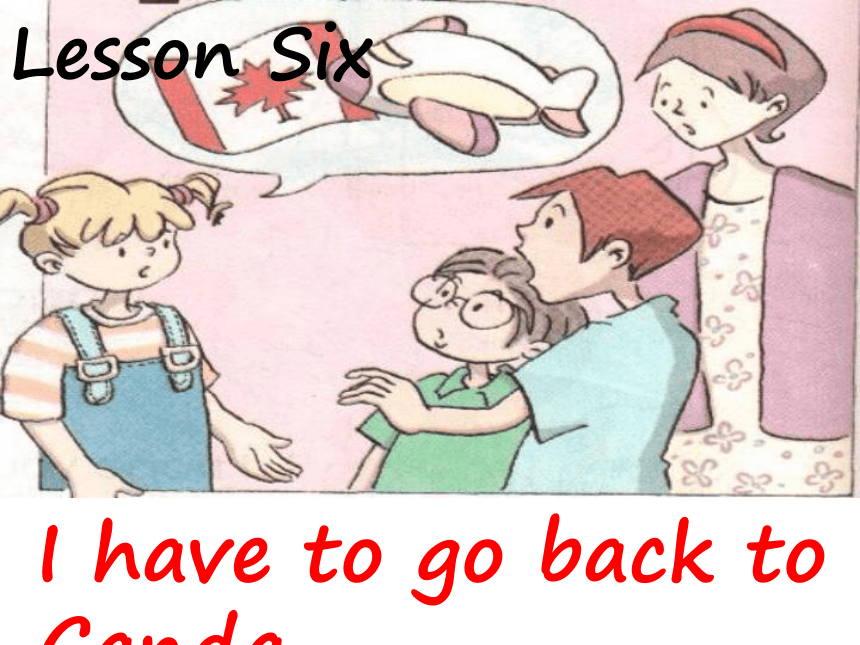
|
|
| 格式 | zip | ||
| 文件大小 | 29.1MB | ||
| 资源类型 | 教案 | ||
| 版本资源 | 教科版(EEC) | ||
| 科目 | 英语 | ||
| 更新时间 | 2017-05-22 00:00:00 | ||
图片预览


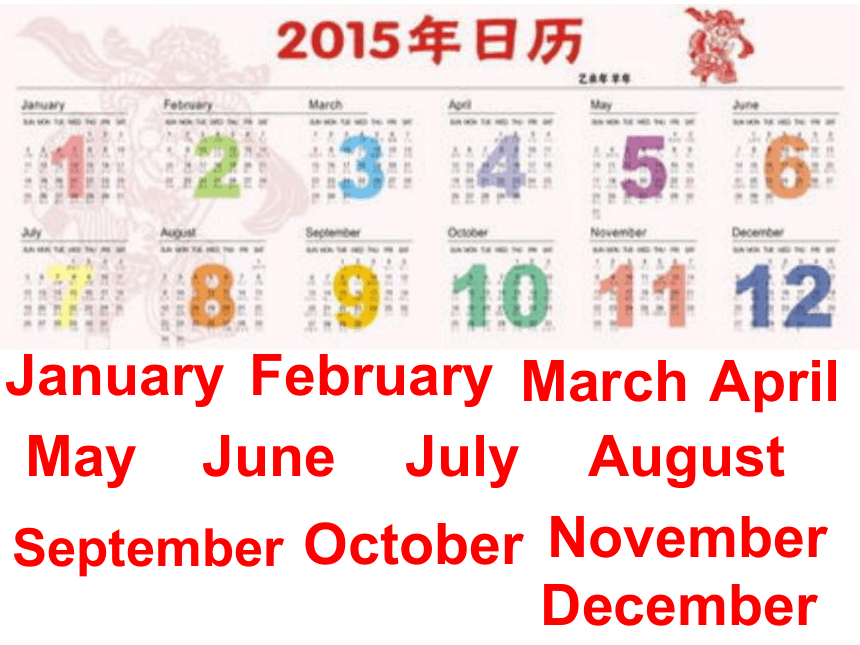
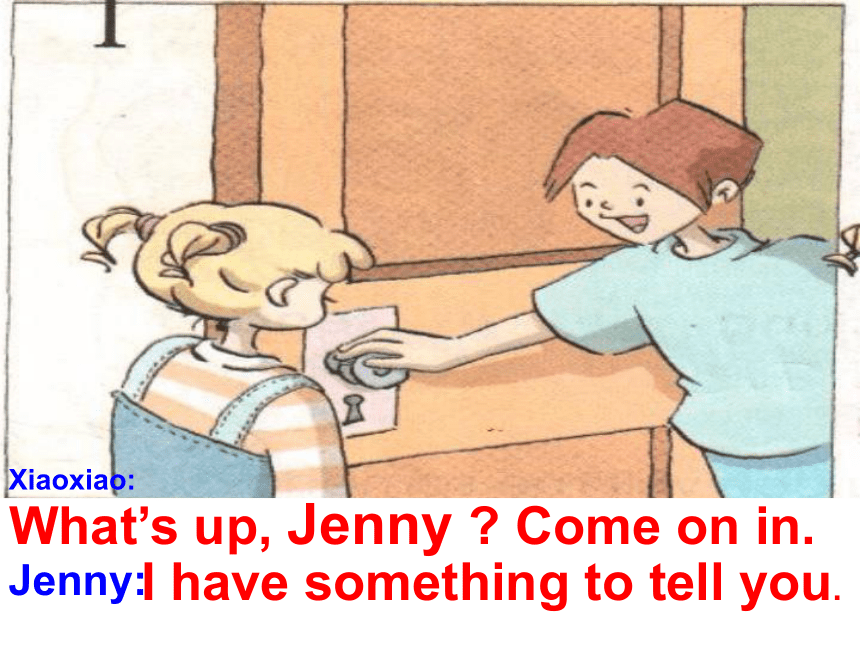
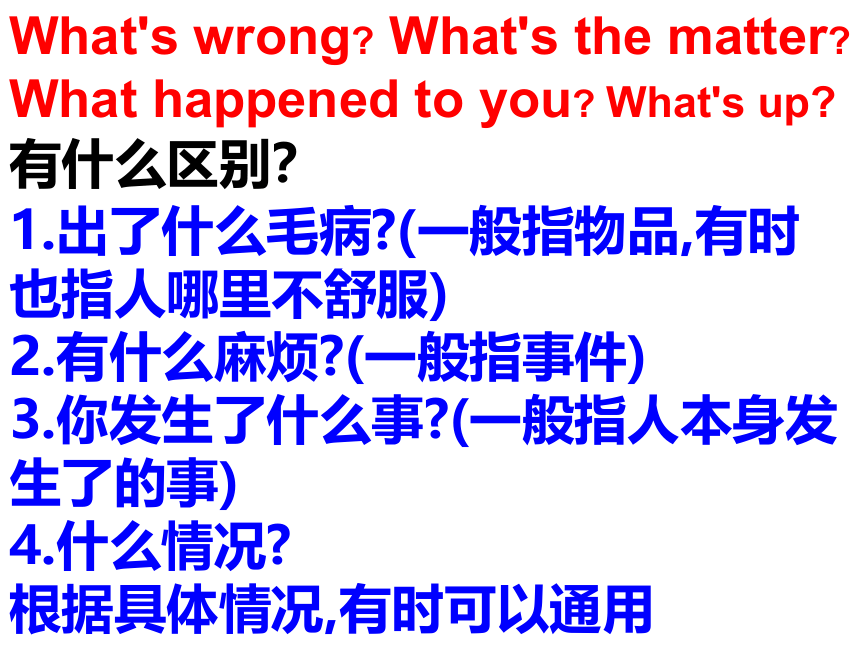

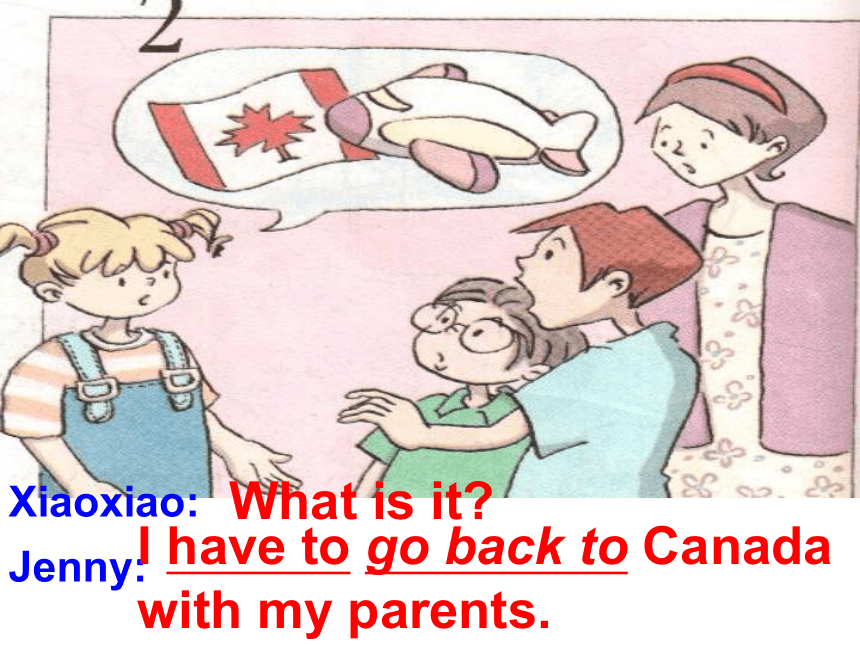
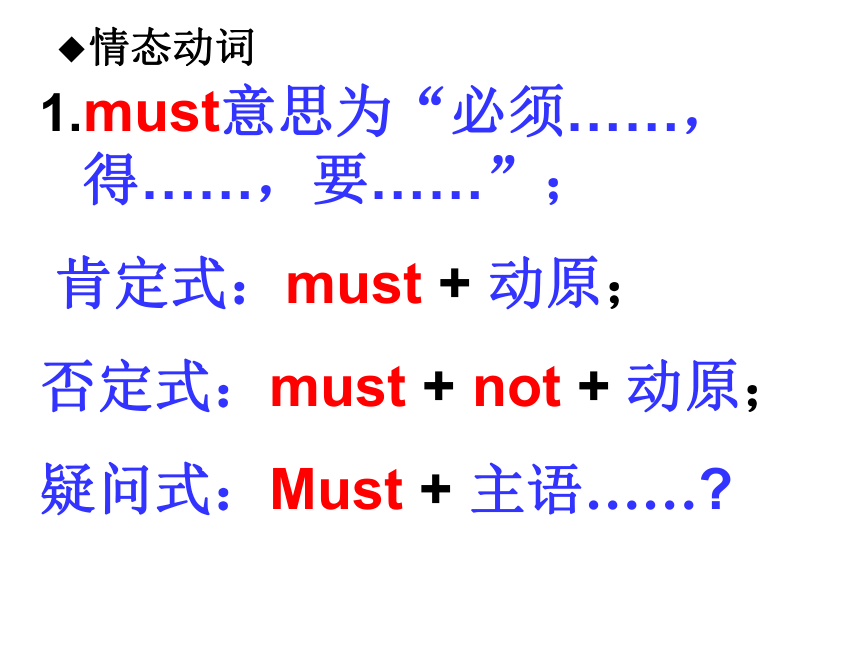
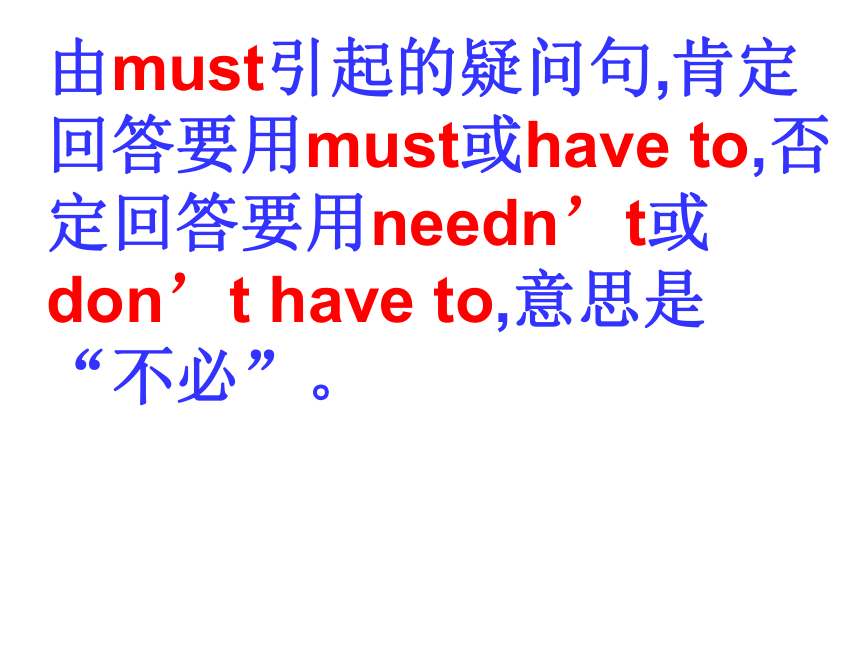
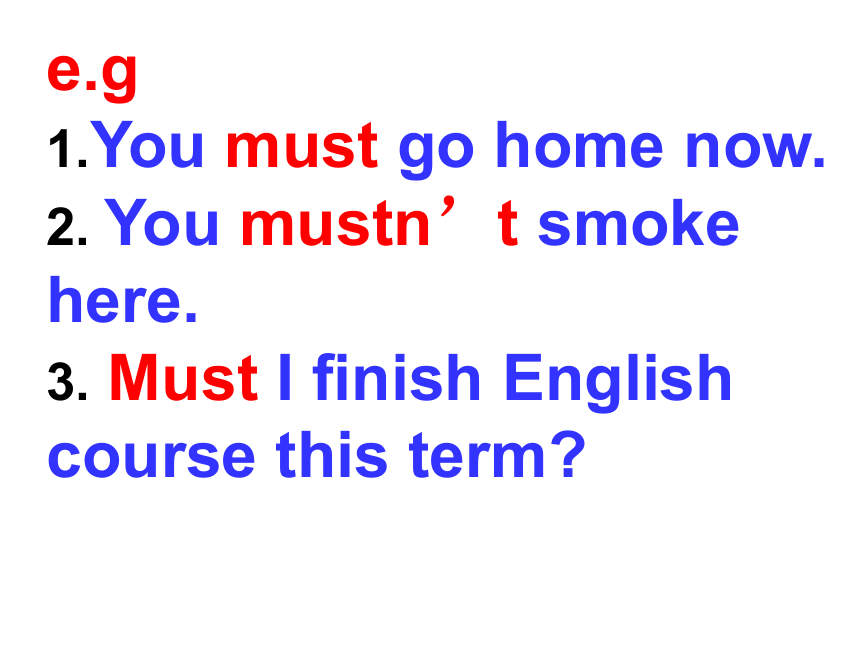
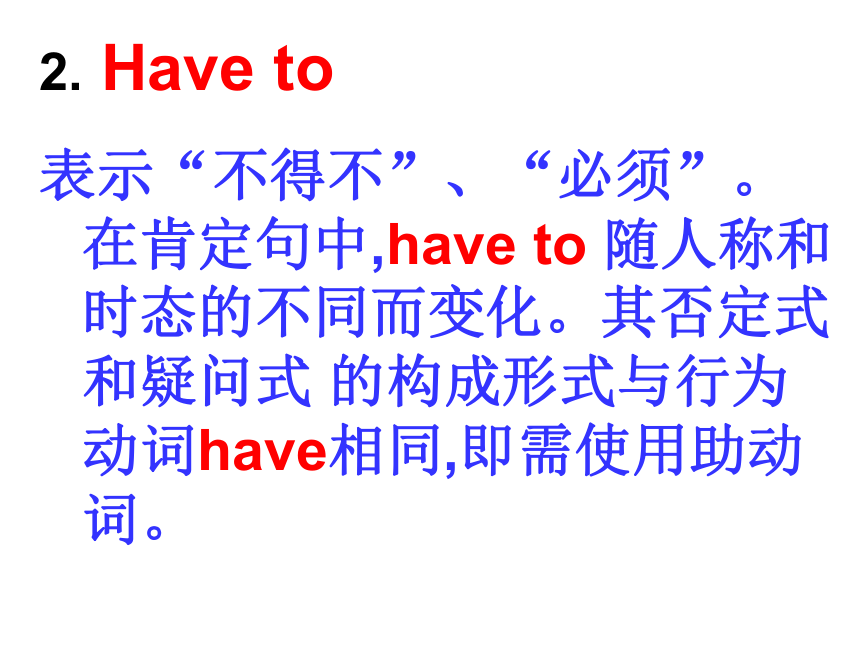
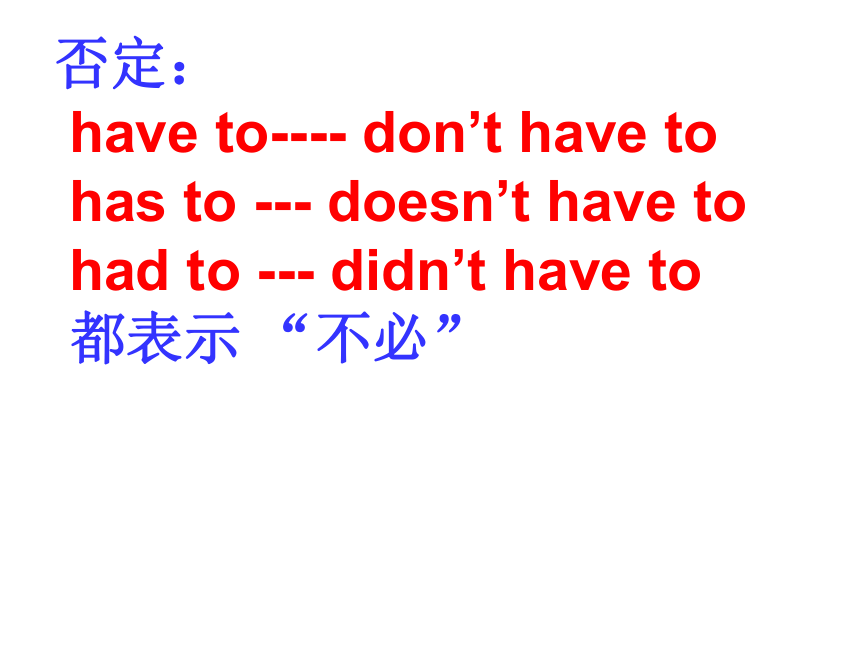
文档简介
课件78张PPT。I have to go back to Canda.Lesson Sixparents父母双亲July miss想念JanuaryMarch April February May June July AugustSeptember October NovemberDecemberWhat’s up, Jenny ? Come on in.Xiaoxiao:Jenny:I have something to tell you.1.出了什么毛病?(一般指物品,有时也指人哪里不舒服)
2.有什么麻烦?(一般指事件)
3.你发生了什么事?(一般指人本身发生了的事)
4.什么情况?
根据具体情况,有时可以通用 What's wrong? What's the matter? What happened to you? What's up?有什么区别?
have something to do…有某事要做1.We have a lot of knowledge to learn.我们有很多知识要学。2.You have lots of homework to finish.你们有很多作业要完成。3.She has some good news to tell you.她有一些好消息要告诉你。Xiaoxiao:Jenny:What is it?I have to go back to Canada with my parents.◆情态动词1.must意思为“必须……,得……,要……”;
肯定式:must + 动原;
否定式:must + not + 动原;
疑问式:Must + 主语……?
由must引起的疑问句,肯定回答要用must或have to,否定回答要用needn’t或don’t have to,意思是“不必”。
e.g
1.You must go home now.
2. You mustn’t smoke here.
3. Must I finish English course this term?
2. Have to
表示“不得不”、“必须”。在肯定句中,have to 随人称和时态的不同而变化。其否定式和疑问式 的构成形式与行为动词have相同,即需使用助动词。
否定:
have to---- don’t have to
has to --- doesn’t have to
had to --- didn’t have to
都表示 “不必”
Have to 的第三人称单数形式是:has to
He/ She/ It/Tom/ My father/ has to
Have to 和has to 的过去式:had toe.g
1). It’s too late. I have to walk home.
2). They don’t have to finish the work today.
3). He had to leave early yesterday.
4). Did he have to leave early yesterday?
3. must 与have to 的区别
must多表示主观意志,是从说话人的角度出发谈必须做某事。而have to强调客观需要。
e.g. A. I must finish my homework today.
B. I have to finish my homework before lunchtime.
二者否定式的意义大不相同。Have to 的否定式表示“不必”,而must not/mustn’t表示“不准”。
e.g. A. I don’t have to finish my homework now.
B. You mustn’t arrive late or you’ll get into trouble.must没有时态变化,而have to 可有不同的时态变化。
e.g.
1).We will have to leave tomorrow.
2).Tom had to finish his work yesterday.
一、请用must, need或have to的适当形式填空。
1. I’ll _________ look after my sister at home this Sunday.
2. You _________ go outside to play as it is snowing heavily.
3. We ________ be polite to our teachers at school. have tomustn’tmust4. I got up late this morning, so I _____ take a taxi to school.
5. —Does she _________ stay at home? ?—No, she doesn’t.
6. —Must I get to the station before 5 p.m.? —Yes, you ______. / No, you ____________________. had tohave tomustdon’t have to / needn’tgo back to回到……Please go back to your seat.请回到你的座位上去。Mike will go back to his country.麦克要回到他的国家去。Jenny has to go back to Canada with her parents.珍妮必须和她的父母一起回到加拿大去。Xiaoxiao:Jenny:Oh,no!When are you leaving?On July 10th. 离开,动身leaving(现在分词)leavebe(am,is,are)+动词的ing形式也可表示将来的动作When are you leaving?你打算什么时候离开/动身?I am leaving on July 10th.我打算七月十号离开。When is the train leaving?火车什么时候发车?It is leaving in ten minutes.十分钟以后发车。Qiaoqiao:Jenny:That’s this Friday.Only three days left.I’m going to miss you guys.left剩下,剩余,左边他还剩好多作业。He's got lots of homework left.
只剩三天就要离开了。There're only three more days left to leave.
Jenny:You were very kind to me.Thank you for everything.Thank you for everything.谢谢你们为我做的一切。5be kind to sb.对某人友好=be friendly to sb.He is kind to me.他对我友好。My friends are kind to him/her.我的朋友对他/她友好。Jenny:I hope you can visit me someday.Xiaoxiao:Of course! We’ll visit you.6Xiaoxiao:Did you finish packing?Jenny:Yes,I did.I should go say good-bye to my other friends.7finish+动词ing+sth.做完某事We have finished learning Lesson Five.我们已经学完第五课了。Did you finish doing your homework?你做完作业了吗?He finished cooking.他做晚饭了。say good-bye to…向…...告别Jenny will say good-bye to her friends.珍妮将要和她的朋友们告别。keep in touch保持联系keep in touch with…与……保持联系He often keeps in touch with his friends.他经常和他的朋友们保持联系。与……说再见Xiaoxiao:Bye.Let’s keep in touch.Qiaoqiao:Don’t forget to send us a letter.8forget to +动词原形+sth.忘记做某事Don’t forget to do your homework.别忘了写作业。When you leave your home,don’t forget to lock the door.当你离开家的时候,别忘了锁门。Spring is beautiful and green. In spring, the air is fresh, the sky is blue, the clouds are white. I often wear a red sweater and blue jeans. I can fly kites on the green grass. In March we can plant trees. In spring, the weather is always sunny and warm, usually I go shopping. Sometimes I go hiking and climb mountains. I like spring. I like spring I like summer
Summer I like summer best!In summer,the weather is sunny and hot.I can eat my favourite food—ice creams!I'm very happy!I like swimming in the pool with my friends.In summer,the flowers are beautiful,the grss is very green.I can have a picnic with my parents.And we have fun! I like summer best!Do you like it,too? Of all the four seasons in a year, I love autumn best.
The Mid-autumn Day is in autumn. We can eat all kinds of mooncakes, watch the bright moon in the evening and see the fallen leaves. National Day is also in this season. We don't go to school, and have a rest for seven days.
It is neither hot nor cold in this season. I love autumn best.I like fall/autumnMy favourite season is winter.Because winter is very cold,so you can see the snow in winter.The snow is white,it is very beautiful.In the winter,I can do some things.I can make a snowman,skate and have a snowball fight.This is my favourite season.Do you like winter?Tell me please. I like winter英语节日大全 1月1日元旦(New Year's Day)2月14日情人节(Valentine's Day/Lovers’ Day3月8日国际妇女节(International Women' sDay) 3月12日中国植树节(China Arbor Day) 3月14日国际警察日(International Policemen' Day) 3月15日世界消费者权益日(World Consumer Right Day) 4月1日愚人节(April Fools' Day) 4月5日清明节(Tomb-sweeping Day) 5月1日国际劳动节(International Labour Day) 5月4日中国青年节(Chinese Youth Day) 5月12日国际护士节(International Nurse Day) 5月17日世界电信日(World Telecommunications Day)? 5月31日 世界无烟日(World No-Smoking Day) 6月1日 国际儿童节(International Children's Day) 7月11日世界人口日(World Population Day) 8月1日中国人民解放军建军节(Army Day) 9月10日中国教师节(Teachers’ Day) 10月1日中华人民共和国国庆节(National Day) 10月31日万圣节(Halloween) 12月25日圣诞节(Christmas Day) 春分月圆后的第一个星期日复活节(Easter Monday)(有可能是3月22-4月25日间的任一天) 5月第二个星期日母亲节(Mother's Day) 6月第三个星期日父亲节(Father's Day) 10月的第二个星斯一加拿大感恩节(Thanksgiving Day) 农历正月初一春节(the Spring Festival) 农历正月十五元宵节(Lantern Festival) 农历五月初五端午节(the Dragon-Boat Festival) 农历七月初七乞巧节(中国情人节)(Double-Seventh Day) 农历八月十五中秋节(the Mid-Autumn Festival) 农历九月初九重阳节(the Double Ninth Festival) 农历腊月初八腊八节(the laba Rice Porridge Festival) When are you leaving?On July 10th.That’s this Friday.Only three days left.你什么时候动身?在七月十号。那就是这个星期五。只剩三天了。aWhen are you coming?你什么时候来?On December 21st.在十二月二十一号。That’s next Wednesday.那就是下周三。One one week left.只剩一周了。b你什么时候走?When are you going?On March 14th.在三月十四号。That’s this Saturday.那就是这个周六。 Only five days left.只剩五天了。cvisitpackingsend拜访打包邮,寄mail 主要用于美式英语,邮寄,跟邮政有关系 Is there any mail this morning? 今天上午有邮件吗? I have mailed the letter.
我已经把那封信寄了。send 除了有“寄”的意思,还有“派遣、打发”的意思。可以send somebody to do something. 而mail 则不能。
He sent his son to return the books to the library.
他派他儿子把书还给图书馆。
You'd better send the letter by air. 这封信你最好寄航空。 post 主要用于英式英语,和 mail 的意思和用法差不多,只是 post 作名词使用时,可解作“柱、杆、岗位、海报”等 Do you mind posting a letter for me? 你能帮我寄封信吗?
The notice was nailed to a post. 布告钉在一根柱子上。 mail , post 都有名词词性,相同的意思为“邮件”,同时也可以做动词,意思是“邮寄”。而send只有动词词性。 mail常用于美式英语,post多用于英式英语。 post可用作定语构成合成词,mail无此用法。 总结:Did you finish packing?Yes,I did.I should go say good-bye to my other friends.Don’t forget to send us a letter.你打完包了吗?是的,我打完了。我应当跟我其他的朋友告别去。别忘记给我们寄信。aalmost几乎zip code邮政编码send sb. a letter给某人寄信Jenny will send Qiaoqiao a letter.珍妮将要给巧巧寄信。send a letter to sb.=Jenny will send a letter to Qiaoqiao.=Did you finish writing a letter?你写完信了吗?Almost.I have to write the address.Don’t forget to write the zip code.差不多了。我必须写地址。别忘了写邮政编码。bDid you finish reading?Yes,I did.I came to borrow other books.Don’t forget to return them.你读完书了吗?是的,我读完了。我来借别的书。别忘记还它们。ccome+to+动原+sth.来做某事Qiaoqiao wants to come to borrow other books.We come to learn English on Saturdays and Sundays. 我们每逢周六和周日来学英语。巧巧想要来借其它的书。Thank you for everything.Of course!I’ll visit you.Not yet.writingwriteaddresszip code/k//s/ 珍妮得到坏消息,所以她今天悲伤。肖肖问她,“怎么了?”她说,“我不得不和我的父母返回加拿大。”肖肖惊奇地问,“哦,不!你什么时候离开?”珍妮说,“在七月十号。”巧巧跑向日历。七月十号在星期五,只剩三天了。 珍妮希望肖肖和巧巧某一天能在加拿大拜访她。他们同意互相保持联系并且写信。珍妮离开跟她其他朋友告别。hastogokeepwriteJanuaryFebruaryMarchAprilMayOctoberJuneJulyAugustSeptemberNovemberDecemberHave a dictation!parentsleave 离开left 剩下,剩余,左miss 思念,错过everything 每件事物someday 有一天say good-bye说再见other 其他的,另外的keep in touch 保持联系letteralmost 几乎zip codereturn156000newscalendareach每一个merry愉快的Teachers' DayNational DayLabor Day
have something to do…有某事要做1.We have a lot of knowledge to learn.我们有很多知识要学。2.You have lots of homework to finish.你们有很多作业要完成。3.She has some good news to tell you.她有一些好消息要告诉你。Xiaoxiao:Jenny:What is it?I have to go back to Canada with my parents.◆情态动词1.must意思为“必须……,得……,要……”;
肯定式:must + 动原;
否定式:must + not + 动原;
疑问式:Must + 主语……?
由must引起的疑问句,肯定回答要用must或have to,否定回答要用needn’t或don’t have to,意思是“不必”。
e.g
1.You must go home now.
2. You mustn’t smoke here.
3. Must I finish English course this term?
2. Have to
表示“不得不”、“必须”。在肯定句中,have to 随人称和时态的不同而变化。其否定式和疑问式 的构成形式与行为动词have相同,即需使用助动词。
否定:
have to---- don’t have to
has to --- doesn’t have to
had to --- didn’t have to
都表示 “不必”
Have to 的第三人称单数形式是:has to
He/ She/ It/Tom/ My father/ has to
Have to 和has to 的过去式:had toe.g
1). It’s too late. I have to walk home.
2). They don’t have to finish the work today.
3). He had to leave early yesterday.
4). Did he have to leave early yesterday?
3. must 与have to 的区别
must多表示主观意志,是从说话人的角度出发谈必须做某事。而have to强调客观需要。
e.g. A. I must finish my homework today.
B. I have to finish my homework before lunchtime.
二者否定式的意义大不相同。Have to 的否定式表示“不必”,而must not/mustn’t表示“不准”。
e.g. A. I don’t have to finish my homework now.
B. You mustn’t arrive late or you’ll get into trouble.must没有时态变化,而have to 可有不同的时态变化。
e.g.
1).We will have to leave tomorrow.
2).Tom had to finish his work yesterday.
一、请用must, need或have to的适当形式填空。
1. I’ll _________ look after my sister at home this Sunday.
2. You _________ go outside to play as it is snowing heavily.
3. We ________ be polite to our teachers at school. have tomustn’tmust4. I got up late this morning, so I _____ take a taxi to school.
5. —Does she _________ stay at home? ?—No, she doesn’t.
6. —Must I get to the station before 5 p.m.? —Yes, you ______. / No, you ____________________. had tohave tomustdon’t have to / needn’tgo back to回到……Please go back to your seat.请回到你的座位上去。Mike will go back to his country.麦克要回到他的国家去。Jenny has to go back to Canada with her parents.珍妮必须和她的父母一起回到加拿大去。Xiaoxiao:Jenny:Oh,no!When are you leaving?On July 10th. 离开,动身leaving(现在分词)leavebe(am,is,are)+动词的ing形式也可表示将来的动作When are you leaving?你打算什么时候离开/动身?I am leaving on July 10th.我打算七月十号离开。When is the train leaving?火车什么时候发车?It is leaving in ten minutes.十分钟以后发车。Qiaoqiao:Jenny:That’s this Friday.Only three days left.I’m going to miss you guys.left剩下,剩余,左边他还剩好多作业。He's got lots of homework left.
只剩三天就要离开了。There're only three more days left to leave.
Jenny:You were very kind to me.Thank you for everything.Thank you for everything.谢谢你们为我做的一切。5be kind to sb.对某人友好=be friendly to sb.He is kind to me.他对我友好。My friends are kind to him/her.我的朋友对他/她友好。Jenny:I hope you can visit me someday.Xiaoxiao:Of course! We’ll visit you.6Xiaoxiao:Did you finish packing?Jenny:Yes,I did.I should go say good-bye to my other friends.7finish+动词ing+sth.做完某事We have finished learning Lesson Five.我们已经学完第五课了。Did you finish doing your homework?你做完作业了吗?He finished cooking.他做晚饭了。say good-bye to…向…...告别Jenny will say good-bye to her friends.珍妮将要和她的朋友们告别。keep in touch保持联系keep in touch with…与……保持联系He often keeps in touch with his friends.他经常和他的朋友们保持联系。与……说再见Xiaoxiao:Bye.Let’s keep in touch.Qiaoqiao:Don’t forget to send us a letter.8forget to +动词原形+sth.忘记做某事Don’t forget to do your homework.别忘了写作业。When you leave your home,don’t forget to lock the door.当你离开家的时候,别忘了锁门。Spring is beautiful and green. In spring, the air is fresh, the sky is blue, the clouds are white. I often wear a red sweater and blue jeans. I can fly kites on the green grass. In March we can plant trees. In spring, the weather is always sunny and warm, usually I go shopping. Sometimes I go hiking and climb mountains. I like spring. I like spring I like summer
Summer I like summer best!In summer,the weather is sunny and hot.I can eat my favourite food—ice creams!I'm very happy!I like swimming in the pool with my friends.In summer,the flowers are beautiful,the grss is very green.I can have a picnic with my parents.And we have fun! I like summer best!Do you like it,too? Of all the four seasons in a year, I love autumn best.
The Mid-autumn Day is in autumn. We can eat all kinds of mooncakes, watch the bright moon in the evening and see the fallen leaves. National Day is also in this season. We don't go to school, and have a rest for seven days.
It is neither hot nor cold in this season. I love autumn best.I like fall/autumnMy favourite season is winter.Because winter is very cold,so you can see the snow in winter.The snow is white,it is very beautiful.In the winter,I can do some things.I can make a snowman,skate and have a snowball fight.This is my favourite season.Do you like winter?Tell me please. I like winter英语节日大全 1月1日元旦(New Year's Day)2月14日情人节(Valentine's Day/Lovers’ Day3月8日国际妇女节(International Women' sDay) 3月12日中国植树节(China Arbor Day) 3月14日国际警察日(International Policemen' Day) 3月15日世界消费者权益日(World Consumer Right Day) 4月1日愚人节(April Fools' Day) 4月5日清明节(Tomb-sweeping Day) 5月1日国际劳动节(International Labour Day) 5月4日中国青年节(Chinese Youth Day) 5月12日国际护士节(International Nurse Day) 5月17日世界电信日(World Telecommunications Day)? 5月31日 世界无烟日(World No-Smoking Day) 6月1日 国际儿童节(International Children's Day) 7月11日世界人口日(World Population Day) 8月1日中国人民解放军建军节(Army Day) 9月10日中国教师节(Teachers’ Day) 10月1日中华人民共和国国庆节(National Day) 10月31日万圣节(Halloween) 12月25日圣诞节(Christmas Day) 春分月圆后的第一个星期日复活节(Easter Monday)(有可能是3月22-4月25日间的任一天) 5月第二个星期日母亲节(Mother's Day) 6月第三个星期日父亲节(Father's Day) 10月的第二个星斯一加拿大感恩节(Thanksgiving Day) 农历正月初一春节(the Spring Festival) 农历正月十五元宵节(Lantern Festival) 农历五月初五端午节(the Dragon-Boat Festival) 农历七月初七乞巧节(中国情人节)(Double-Seventh Day) 农历八月十五中秋节(the Mid-Autumn Festival) 农历九月初九重阳节(the Double Ninth Festival) 农历腊月初八腊八节(the laba Rice Porridge Festival) When are you leaving?On July 10th.That’s this Friday.Only three days left.你什么时候动身?在七月十号。那就是这个星期五。只剩三天了。aWhen are you coming?你什么时候来?On December 21st.在十二月二十一号。That’s next Wednesday.那就是下周三。One one week left.只剩一周了。b你什么时候走?When are you going?On March 14th.在三月十四号。That’s this Saturday.那就是这个周六。 Only five days left.只剩五天了。cvisitpackingsend拜访打包邮,寄mail 主要用于美式英语,邮寄,跟邮政有关系 Is there any mail this morning? 今天上午有邮件吗? I have mailed the letter.
我已经把那封信寄了。send 除了有“寄”的意思,还有“派遣、打发”的意思。可以send somebody to do something. 而mail 则不能。
He sent his son to return the books to the library.
他派他儿子把书还给图书馆。
You'd better send the letter by air. 这封信你最好寄航空。 post 主要用于英式英语,和 mail 的意思和用法差不多,只是 post 作名词使用时,可解作“柱、杆、岗位、海报”等 Do you mind posting a letter for me? 你能帮我寄封信吗?
The notice was nailed to a post. 布告钉在一根柱子上。 mail , post 都有名词词性,相同的意思为“邮件”,同时也可以做动词,意思是“邮寄”。而send只有动词词性。 mail常用于美式英语,post多用于英式英语。 post可用作定语构成合成词,mail无此用法。 总结:Did you finish packing?Yes,I did.I should go say good-bye to my other friends.Don’t forget to send us a letter.你打完包了吗?是的,我打完了。我应当跟我其他的朋友告别去。别忘记给我们寄信。aalmost几乎zip code邮政编码send sb. a letter给某人寄信Jenny will send Qiaoqiao a letter.珍妮将要给巧巧寄信。send a letter to sb.=Jenny will send a letter to Qiaoqiao.=Did you finish writing a letter?你写完信了吗?Almost.I have to write the address.Don’t forget to write the zip code.差不多了。我必须写地址。别忘了写邮政编码。bDid you finish reading?Yes,I did.I came to borrow other books.Don’t forget to return them.你读完书了吗?是的,我读完了。我来借别的书。别忘记还它们。ccome+to+动原+sth.来做某事Qiaoqiao wants to come to borrow other books.We come to learn English on Saturdays and Sundays. 我们每逢周六和周日来学英语。巧巧想要来借其它的书。Thank you for everything.Of course!I’ll visit you.Not yet.writingwriteaddresszip code/k//s/ 珍妮得到坏消息,所以她今天悲伤。肖肖问她,“怎么了?”她说,“我不得不和我的父母返回加拿大。”肖肖惊奇地问,“哦,不!你什么时候离开?”珍妮说,“在七月十号。”巧巧跑向日历。七月十号在星期五,只剩三天了。 珍妮希望肖肖和巧巧某一天能在加拿大拜访她。他们同意互相保持联系并且写信。珍妮离开跟她其他朋友告别。hastogokeepwriteJanuaryFebruaryMarchAprilMayOctoberJuneJulyAugustSeptemberNovemberDecemberHave a dictation!parentsleave 离开left 剩下,剩余,左miss 思念,错过everything 每件事物someday 有一天say good-bye说再见other 其他的,另外的keep in touch 保持联系letteralmost 几乎zip codereturn156000newscalendareach每一个merry愉快的Teachers' DayNational DayLabor Day
